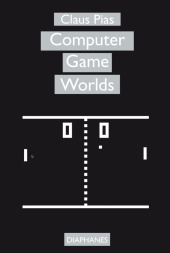 Neuerscheinungen 2017Stand: 2020-02-01 |
Schnellsuche
ISBN/Stichwort/Autor
|
Herderstraße 10
10625 Berlin
Tel.: 030 315 714 16
Fax 030 315 714 14
info@buchspektrum.de |

Valentin Pakis, Claus Pias
(Beteiligte)
Computer Game Worlds
Übersetzung: Pakis, Valentin
2017. 352 p. 23,5 cm
Verlag/Jahr: DIAPHANES 2017
ISBN: 3-03-580013-8 (3035800138)
Neue ISBN: 978-3-03-580013-5 (9783035800135)
Preis und Lieferzeit: Bitte klicken
Computerspiele bestimmen die Lage auf Millionen privater Bildschirme. Seit einem Vierteljahrhundert sind sie keine Angelegenheit von Labors, Militärberatern oder Subkulturen mehr, sondern erzeugen und erhalten populäre Medienverbünde, deren Umsätze diejenigen Hollywoods in den Schatten stellen. Pädagogen zeigen sich allerorts besorgt, die Kulturwissenschaften allmählich interessiert, und es gibt die ersten Computerspiel-Museen. Doch niemand hat bisher die einfachste aller Fragen gestellt: Warum gibt es Computerspiele? Denn Computerspiele (wie wir sie kennen) kamen unbestellt und sind schon darum alles andere als eine Selbstverständlichkeit. Was jedoch ist das für ein merkwürdiges Datum und wo ist der Ort, an dem völlig heterogene Gerätschaften, Körper und Symboliken (lange vorbereitet und dennoch plötzlich) zu einem Spiel gänzlich neuer Art zusammenfinden? Was für ein Wissen ist es, das Techniken, Institutionen und Maschinen durchquert und sich zu bestimmen anschickt, was die Spiele des Menschen heute sind?
Computer games dominate millions of private computer screens. For half a century they have no longer been the exclusive business of laboratories, military advisors and subcultures. Nevertheless, no one has ever posed the most obvious of all questions: why do computer games exist? Computer games (as we know them) came unasked for and cannot be taken for granted, if only for this one simple reason. But what peculiar date and place brought such completely heterogeneous appliances, bodies and symbolisms together to form (long-prepared and yet sudden) this totally new kind of game? What type of knowledge is it that cuts across technologies, institutions and machines striving to shape today´s games? Pias´s archaeology of the computer game is not solely a survey of the numerous objects, apparatus and ensembles which have been crafted, constructed and installed only to reappear one day as commercial products. It is, simultaneously and exceedingly, also an epistemical reconstruction of game playing at and with computers and by computers themselves, an archaeology of the computer game which no longer relies on the individual´s freedom from "his" or "her" game. It is the economies of time, decision and regulation, embodied in hard- and software, that form the materiality of the games in which information societies think their own game.
7 - 13 Introduction (Claus Pias)15 - 18 1. Kairos (Claus Pias)18 - 22 2. Experimental Psychology (Claus Pias)22 - 31 3. Army Mental Tests (Claus Pias)32 - 59 4. Ergonomics (Claus Pias)59 - 71 5. Calculating Motion (Claus Pias)72 - 93 6. Visibility and Commensurability (Claus Pias)94 - 109 7. A New Ergonomics (Claus Pias)110 - 123 8. Computer Games (Claus Pias)125 - 131 9. Caves (Claus Pias)131 - 150 10. The Construction of the Artificial World (Claus Pias)150 - 164 11. Narratives (Claus Pias)165 - 199 12. Programs, Labyrinths, Graphs (Claus Pias)201 - 208 13. "That Na‹ve Concept of Utility" (Claus Pias)208 - 214 14. Chess and Computers (Claus Pias)214 - 240 15. Tactical Chess and War Games (Claus Pias)240 - 257 16. Operations Research and the Weather (Claus Pias)257 - 284 17. The 1950s (Claus Pias)284 - 313 18. The 1960s (Claus Pias)313 - 324 19. The 1970s (Claus Pias)325 - 326 Afterword (Claus Pias)327 - 347 Works Cited (Claus Pias)349 - 355 Index (Claus Pias)


